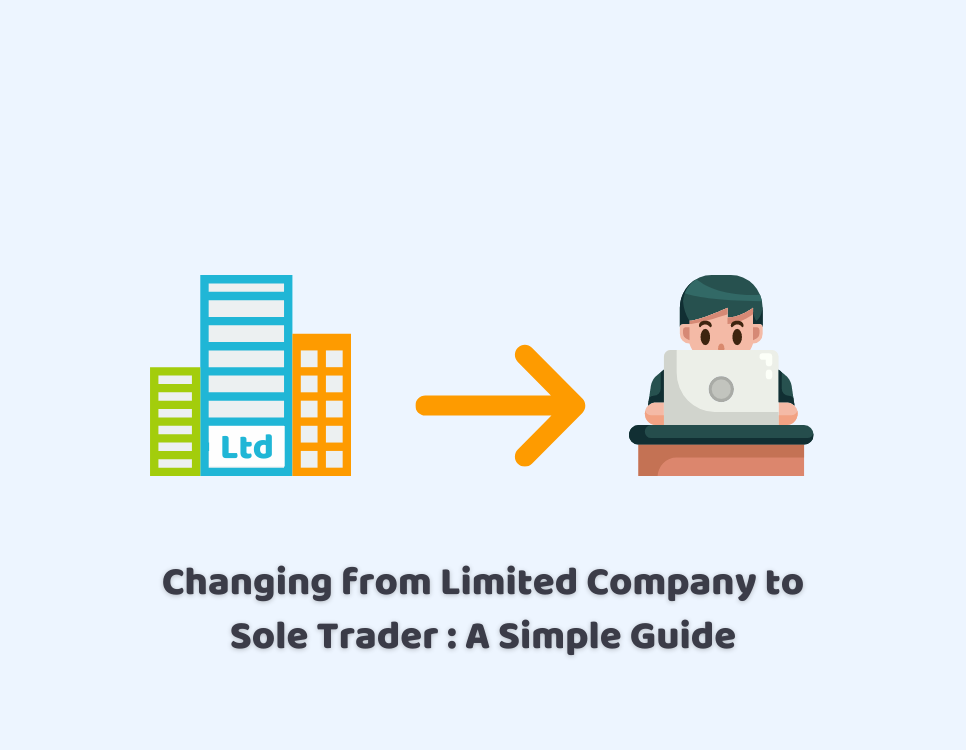
16/07/2021Limited Company , Sole Trader
There are many reasons for changing from a limited company to a sole trader. The most common reason – we have seen these days – is the dropping turnover of limited companies due to the impacts of the COVID-19 pandemic. Company owners believe that sole proprietorship is a simple and convenient option to go for. No doubt it is. In this way, they’d save a considerable amount of money – which they are losing as a limited company owner – by becoming a sole trader. There are many other businesses that are going after this option.
But there are a few crucial points that you need to consider if you are changing from a limited company to a sole trader.
Few Important Points to Consider
Here are a few important points that you to consider before changing your business structure.
- Firstly, you need to know that sole tradership doesn’t require any registration. You can start your business right away, just by informing HMRC.
- Secondly, note that sole traders do not have limited liability which means you’re not protected in case of loss or insolvency. It depends on your business type and how much you’re at risk of potential liabilities and insolvency.
- Thirdly, winding up a limited company needs a proper legal procedure to follow. You need to submit final accounts to HMRC along with taxes. In addition, this process requires more paperwork like you need the file for capital distribution and so on. After getting through this complex and time-taking process, your company can be struck off from the register.
- Fourthly, if a limited company has suffered a loss previously, it needs accounting. So, you need to consult this matter with an accountant as after its cessation the records of corporation tax losses will be lost. The accountant will bring them forward to offset against a future profit of a company. Remember, you’d lost the opportunity to offset the losses when your company is closed. Obviously, it is not possible to use the company’s losses against the profit made from the sole trading activity.
- Finally, after changing from a limited company to a sole trader, you need to inform your customers and suppliers about becoming a sole trader. So that you may sign new contracts with the new people. Moreover, you will also change your company account to a business account.
What Made you Became a Limited Company?
After considering the above points, you need to ask this yourself before making the final decision. You opted for a limited company to get liability protection, credibility, save tax and so on.
Though the situation has been better after the vaccination of more than 52% of the UK’s population. This doesn’t mean that everything will revert instantly as it was before the arrival of the pandemic. According to the government scientists of the UK, the third wave is going to arrive that would leave the same impact as the previous ones.
So, the complete revert will take time, so changing your business structure might be a good option if you can’t wait for an unexpected time. However, if you think that your business is going well and will be in the future, you should not go for this option.
Looking for a qualified accountant, bookkeeper or tax expert at a reasonable price? Get in touch with us right now!
Our Advice
We recommend clients to wait for 6 months before changing their business status. As within the six months, the situation would be expectedly better due to the continuous vaccination. So waiting for this time wouldn’t hurt your business a lot. Still, if your business is constantly declining, then turning to a sole proprietorship is worth considering.
Final Thoughts
Finally, if you are changing from a limited company to a sole trader. You need to consider these points:
- Talk to our limited company accountant to review your accounts to utilise the losses before becoming a sole trader
- Extract all your money from the limited company by seeking advice from our accountants
- Pay the due taxes and outstanding bills to HMRC before closing your bank account
- Get advice to know the impact of financial support by the government during the current pandemic
To sum up, you need to get advice from an accountant to make the final decision.
If you are looking for an accountant to review the financial affairs of a business, look no further other than CruseBurke. We have a team of expert accountants for your assistance. Don’t hesitate to get in touch with us.
Get an instant quote right away!
Disclaimer: This blog provides general information on the above topic.



